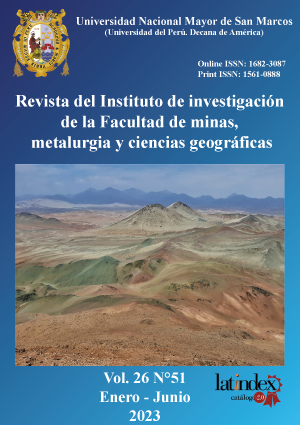Automation of exploratory data analysis and univariate geochemical processing using Python
DOI:
https://doi.org/10.15381/iigeo.v26i51.24493Keywords:
Exploratory data analysis, univariate analysis, automation, Python, scriptAbstract
Process automation is being implemented in different disciplines of earth sciences, as seen in the implementation of libraries such as Pyrolite, PyGeochemCalc, dh2loop 1.0, NeuralHydrology, GeoPyToo among others. The present work addresses a methodology to automate the geochemical univariate analysis by using Python and open-source packages such as pandas, seaborn, matplotlib, statsmodels which will be integrated into a script in a local work environment such as Jupyter notebook or in an online environment such as Google Collaboratory. The script is designed to process any type of geochemical data, allowing to remove outliers, perform calculations and graphs of the elements and their respective geological domain. The results include graphics such as boxplot, quantile-quantile and calculations of normality tests and geochemical parameters, allowing to determine the background and threshold of the elements worked. The result of the geochemical parameters will be further processed in geographic information software which allows to generate the univariate anomaly map and the anomalous basins.
Downloads
Published
Issue
Section
License
Copyright (c) 2023 Brayan Jarry Castillo Requiz, Jesús Daniel Tarazona Silva, Cristian Eugenio Tarazona Silva, Christian Hurtado Enriquez, Félix Abraham Cornelio Orbegoso

This work is licensed under a Creative Commons Attribution 4.0 International License.
AUTHORS RETAIN THEIR RIGHTS:
a. Authors retain their trade mark rights and patent, and also on any process or procedure described in the article.
b. Authors retain their right to share, copy, distribute, perform and publicly communicate their article (eg, to place their article in an institutional repository or publish it in a book), with an acknowledgment of its initial publication in the Rev. Inst. investig. Fac. minas metal cienc. geogr.
c. Authors retain theirs right to make a subsequent publication of their work, to use the article or any part thereof (eg a compilation of his papers, lecture notes, thesis, or a book), always indicating the source of publication (the originator of the work, journal, volume, number and date).






